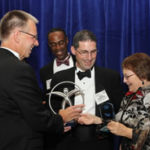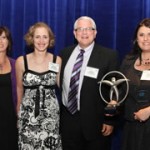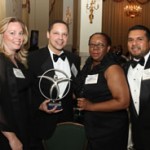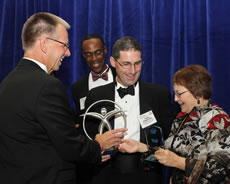
Things are looking up for six U.S. schools dedicated to providing innovative and effective STEM education, thanks to Intel Education’s donation of more than $1 million as part of the company’s Schools of Distinction Awards (SODA).
This annual award is in its seventh year as part of the company’s “quest to prepare tomorrow’s innovators,” and the six schools honored do just that in the areas of innovative math and/or science programs.
“The critical knowledge base provided by math and science education is the foundation for innovation,” said Shelly Esque, vice president of Intel’s Corporate Affairs Group. “These schools imbue a deep passion for math and science in the next generation, a critical requirement for America to remain competitive in the global economy.”
Twelve finalists were selected from 149 applications. The 2010 finalists were from Florida, Kansas, Texas, New York, California, Illinois, North Carolina, Virginia, Louisiana, New Jersey, Massachusetts, Connecticut, and Ohio. You can find more information about these finalists here.
In recognition of and support for their efforts, each of the six winning schools will receive an estimated $160,000 through a combination of cash grants from the Intel Foundation and an award package of curriculum materials, professional development resources, and hardware and software from program sponsors, which include Blackboard Collaborate, Brainware Safari, Dell, DyKnow, I-CAN, SAS, Scantron, SMART Technologies, and Tabula Digita.
The six schools that received awards are Thomas Jefferson High School for Science and Technology (Alexandria, Va); Roxbury Preparatory Charter School (Roxbury, Mass.); Westdale Heights Academic Magnet School (Baton Rouge, La.); M.S. 223 The Laboratory School of Finance and Technology (Bronx, N.Y.); West Elementary (Wamego, Kan.); and Walter Payton College Prep (Chicago, Ill.).
The awards were announced as part of a black-tie dinner affair hosted in Washington, D.C., Sept. 14.
“We have such gratitude for Intel,” said Amy Flinn, principal of West Elementary, “because they’re really committed to developing 21st-century skills in students and investing in the future. The sponsors are also providing a great opportunity to explore new hardware and software.”
“Now is the time for corporate enterprises to invest in education for the future,” said Doug Conwell, West Elementary superintendent. “We really are a believer in Intel’s mission.”

West Elementary, which serves students in grades three through five in rural Kansas, has 305 student currently enrolled. The school takes pride in many of its innovative math and science programs, some of which include a robotics club for fifth-graders, a six-week aerospace program for fourth graders, and a grant-developed outdoor science classroom.
“Group work and including real-world problem solving is so important in making students engaged and showing how STEM is relevant in today’s world,” said Flinn.
“All students, not just those with a natural proclivity to STEM, need these skills,” said Conwell, “because in today’s economy, even if you want to be an auto mechanic, you need to know engineering and math.”
Flinn said school representatives felt like it was Christmas morning after the awards were announced.
“One teacher said she wanted to put on her pajamas and put her hair in a ponytail and go downstairs to do our meetings,” she said.
Conwell said the school will use its grant money to support sustainable programs, because “obviously, the money won’t last forever.”
Ramon Gonzales, principal of M.S. 223, said his school will use the money to support teachers and continue to give students life experiences.
M.S 223 serves 500 students in grades six through eighth in the Bronx. Nearly 95 percent are Title 1 students, with 70 percent Latino and 29 percent African-American.
“We don’t believe in an ‘achievement gap,’ we believe in an ‘experience gap,’” Gonzales said. “These kids, who are neighborhood kids, who aren’t kids who are pulled from any type of lottery, don’t get to experience things middle-class people might take for granted, like a book store or a museum. We try to not … just focus on math and science, but provide students with the skills and experiences they need to succeed in life.”

According to Gonzales, providing life experiences means going on city field trips, interacting with community professionals, hosting multiple career days, and having a “school economy.”
The school economy, explained Gonzales, is a system developed by the school to teach students about finances. Student can apply for jobs to help teachers earn “school bucks,” and then use those bucks toward activities and more.
For example, if a student wants to go to a dance, he or she must have enough “bucks” to go.
“We want to teach them about saving and setting goals for themselves. Goals for their bucks, but also academically,” said Gonzales. “We want them to be independent learners focused on their goals and learning how they learn best, through real-life experiences.”
He also explained that part of what makes his school “not just good, but great,” is that the school realizes how important teachers are.
“A lot of the money will probably go to professional development and to continue funding our collegiate inquiry program, where we pay our teachers to work with collegiate researchers on teaching strategies. We’ll also use that money to pay for staff visits to these other winning schools to learn best practices and share ideas,” he said. “We are continually in the process of making our school the best school for all students.”
Of the six schools, Walter Payton College Prep, which has a student body representing youth from more than 100 elementary schools around Chicago, took home the top award in the SODA contest, called the “Star Innovator Award,” which brings an additional $15,000 from the Intel Foundation, for a total of $175,000 in cash and prizes.
Walter Payton is a citywide magnet school that serves a diverse student body and focuses on mathematics, science, and world languages. Math teachers participate in lesson study and are engaged in collaborative processes. All courses include measurement, data analysis, and modeling activities, using the same digital lab instruments used in science classes. The school schedule includes block lessons once a week and innovative, co-curricular seminars throughout the semester to engage students in the study of advanced or unusual topics, school officials say.
More than a quarter of students take five or more math courses before graduation, opting for AP Statistics and university-level electives. More than 99 percent of Payton students meet or exceed state math standards.
“Payton requires four years of science and math,” said Ellen Estrada, the school’s principal. “That’s our philosophy—students need more math and science in their youth. We have a high level of integration of technology in our classrooms, which engages students and keeps them current with 21st-century skill-building.”
Payton students have a 98-percent graduation rate and excel in academic competitions. The school also has a record of helping students qualify for AP courses and pass AP tests.
Links:
Intel SODA
Note to readers:
Don’t forget to visit the Igniting and Sustaining STEM Education resource center. As the workplace changes and becomes increasingly global, today’s students must be educated with a 21st-century mindset. Science, technology, engineering, and math (STEM) skills are no longer just “good skills” to have; they are increasingly vital to a 21st-century education—and students should begin cultivating these skills as early as possible. Go to:
Igniting and Sustaining STEM Education
- #4: 25 education trends for 2018 - December 26, 2018
- Video of the Week: Dealing with digital distraction in the classroom - February 23, 2018
- Secrets from the library lines: 5 ways schools can boost digital engagement - January 2, 2018

